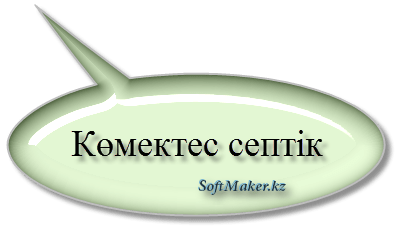Instrumental case (kómektes septik) of nouns in the Kazakh language, the description and examples
Instrumental case (kómektes septik) of the Kazakh language corresponds to the Subjective Case in English with the preposition to, on, by, with.
| Qazaq | English |
| Ajar Sáýle-men dos | Azhar and Saule are friends |
| Ajar dos qyzy-men kınoǵa bardy | Azhar and a friend went to the movies |
| Janna kaladan mashına-men keldi | Jeanne came from the city by car |
| Men sheshem-men bazarǵa bardy | I went to the market with my mother |
| Munda men mashına-men keldim | I came here by car |
| Juma saıyn radıo-men tatardyń halyq áni beriledi | On Fridays Tatar folk songs broadcasts on the radio |
Questions
The instrumental case (kómektes septık) answers questions kimmen? (with whom? whom?), nemen? (what?) and is used to indicate the object with which the action is performed or to which it is directed. When compared with the nominative case (ataý septik), we see the following: Jol (the road) — Jol-men (by road).
| Qazaq | English | Question |
| Men onda dosym-men jolyqtym | I met there with the friend | kimmen? |
| Men seni-men ketpekpin | I’m going to leave with you | kimmen? |
| Men erteń seni-men sóılesemin | Tomorrow I’ll talk to you | kimmen? |
| Men sút-pen shaı ishpekpin | I’m going to drink tea with milk | nemen? |
| Almatyda tramvaı-men, avtobýs-pen, troleıbýs-pen júredi | Almaty travel on trams, buses and trolleybuses | nemen? |
| Qalam-men, qaryndash-pen qaǵazǵa jazady | On paper write with a pen and pencil | nemen? |
Endings
Nouns in instrumental case (kómektes septık) take the endings -men, -ben, -pen:
- If the base word ends in the vowels -a, -á, -e, -ı, -ý, -y, -i and sonoric vowels -ı, -l, -m, -n, -ń, -r, -ý, then the ending -men is added to it.
Qazaq English Ahmet ashanada Asan-men birge tamaqtandy Ahmet with Asan went to the dining room to eat Erǵalı-men kınoǵa bardym I went to the movies with Yergali Bor-men taqtaǵa jazady On the blackboard write with chalk Kisiler arba-men júredi People walk with a cart Egindi kombaın-men jınaıdy The crop is harvested by combine harvester. Jerdi traktor-men jyrtady Plows the ground with a tractor - If the final sound of word voiceless consonant -k, -q, -p, -s, -t, -sh
or ends in a voiced consonant -b, -v, -g, -ǵ, -d, then the ending -pen is added to it.Qazaq English Alysqa ushaq-pen ushady They fly far by plane Men sizge izgi nıet-pen kel-di-m* I came to you with good intentions Kitap-pen kóp jumys isteý kerek You need to work a lot with the book Men qardy kúrek-pen kúrdim I drew snow with a shovel Ańshy myltyq-pen atty The hunter fired with a rifle * Kel-di-m = I came – The suffix of the simple past tense is added here.
- If the base words ending in voiced consonants -j,-z, then the ending -ben is added to it.
Qazaq English Áje toqyma biz-ben oramal toqydy Grandma knitted a scarf on the needles Men poez-ben keledi I arrived by train Ol qyz-ben kınoǵa bardy He went to the movies with a girl Men erteń siz-ben sóılesemin Tomorrow I’ll talk to you



